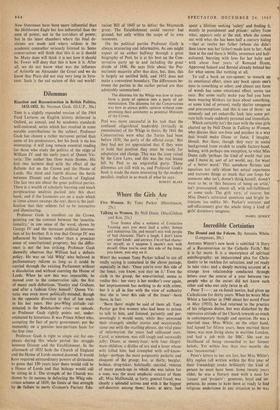Dilemmas
Tuts is a slightly expanded version of the 1964 Ford Lectures on English history delivered in Oxford, an annual, and by academic standards well-endowed, series which has resulted in some notable contributions to the subject. Professor Gash has chosen a rather narrower period than some of his predecessors, but his book is no less interesting; it will long remain essential reading for those who study the politics of the reign of William IV and the early years of Queen Vic- toria. • The author has three main themes. His first two lectures deal with the effect of the Reform Act on the Crown and the House of Lords. His third and fourth discuss the battle between Dissent and the Church of England. The last two are about the great political parties. There is a wealth of scholarly learning and much perspicacious analysis packed into this short book, and if the footnotes are on a scale which at times almost swamps the text, there is the justi- fication that they seldom fail to be instructive and illuminating.
Professor Gash is excellent on the Crown, pointing out the contrast between the `constitu- tionality,' in one sense of the word, shown by George IV and the incessant political interven- tion of his brother. It is true that George IV was influenced by laziness rather than a prescient sense of constitutional propriety, but the differ- ence is not the less striking. Professor Gash shrewdly observes that William had a definite policy. He was an `old Whig' who believed in parliamentary reform as long as it could be carried through the existing Parliament without a dissolution and without coercing the House of Lords. When he saw this was impossible, he moved over to the conservative side, the first of many such defections, `Stanley and Graham, and after a fashion Grey himself.' Queen Vic- toria was even more politically-minded, though in the opposite direction to that of her uncle in his last years. Her pro-Whig attitude cul- minated in the Bedchamber crisis—an episode, as Professor Gash rightly points out, under- estimated by historians..lt was Prince Albert who, accepting the fact of party government, put the monarchy on a genuine non-partisan basis for the first time.
Professor Gash is right to single out for em- phasis during this whole period the struggle between Dissent and the Establishment. In the aftermath of 1832 both the Church of England and the House of Lords seemed doomed. It would have required extraordinary powers of divination to guess that 130 years later there would still be a House of Lords and that bishops would still be sitting in it. The strength of the Church was shown by its success in defeating the Whig edu- cation scheme of 1839, the limits of that strength by its failure to carry Graham's Factory Edu-
cation Bill of 1843 or to defeat the Maynooth grant. The Establishment could recover lost ground, but only within the scope of its own resources.
On the political parties Professor Gash is always interesting and informative. As one might expect of an author halfway through a great biography of Peel, he is at his best on the Con- servative party up to and including the great divide of 1846. He says little about the Pro- tectionist majority after that date, but, then, this is largely an untilled field, and 1852 does not make a convenient boundary. The differences be- tween the parties in the earlier period are thus admirably summarised: The dilemma for the Whigs was how to trans- form a party of opinion into a party of ad- ministration. The dilemma for the Conservatives was how to attract public opinion without com- promising their autonomy as potential Ministers of the Crown.
Peel was more successful in his task than the confused oligarchical leadership (virtually in commission) of the Whigs in theirs. By 1841 the Conservatives were what the Tories had been before 1830, 'the party of the official corps.' But they had not yet appreciated that if they were to hold that position they must be ready for adaptation and change. This was the issue raised by the Corn Laws, and this was the real lesson left by Peel to an ungrateful party. These dilemmas are still with us, and Professor Gash's book is made the more interesting by the modern parallels implicit in so much of what he says.
ROBERT BLAKE






























 Previous page
Previous page